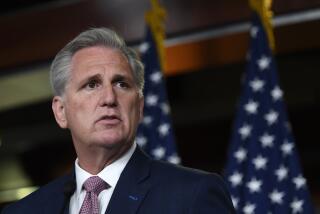Budget Medicine All Too Poisonous : Donât squeeze the poor and helpless any more
Louis W. Sullivan, President Bushâs secretary of health and human services, has sent a public distress signal on behalf of some 50 million poor, sick, elderly and disabled Americans.
Last weekâs signal was meant for the Presidentâs eyes only, but it was sent in the open. Thatâs because what Sullivanâs people need to be rescued from is Bushâs own budget director, Richard G. Darman, and the only way to be sure the President saw the signal was to go public. Sullivanâs move was absolutely right if, indeed, Darman is intending to pare the budget deficit by squeezing the nationâs poor and helpless any harder.
Sullivan did not use any dollar figures, but his department spent 35% of the total federal budget last year. Even if Darman were proposing what might seem a nominal cut of 5%, Sullivanâs programs would be looking at a loss of $22 billion.
Clamped between falling revenues in a deepening recession and a debt burden that makes borrowing to make up the losses out of the question, the fiscal 1992 federal budget will start out tighter than any in recent memory. It may wind up even tighter. Darmanâs Office of Management and Budget has already advised program directors ranging from space exploration to highway repair that they are not likely to get what they asked for. Sullivanâs message is that cutting such things as Medicare payments to teaching hospitals, many of them in the poorest sections of American cities, goes too far.
Sullivan said that his department would treat Darmanâs proposed cuts as advisory only, adding that Darmanâs office could not substitute its own judgment for staffing and management recommendations from âresponsible policy officials and program administrators.â
Accepting Darmanâs proposals, Sullivan said, would seriously erode his departmentâs ability to meet the needs of the millions of people who depend on its programs, among them Social Security, Medicare and Medicaid (known in California as MediCal) the only access to medical treatment for millions of poor Americans.
For example, Sullivan wrote, it already takes 50 days to process Medicare claims, well beyond limits set by law. Darmanâs proposal to trim the staff that handles Medicare claims by nearly 25% would would stretch the delay to about 80 days.
In addition, he said, cuts of the magnitude proposed by OMB would hamper efforts to cope with âdisgracefully high ratesâ of infant mortality by reducing funds for prenatal care and put the squeeze on other programs for the poor and minorities.
Discussions between the secretaryâs staff and OMB are making headway. A department spokesman says, for example, that the number of Americans affected by Darmanâs proposals is now below Sullivanâs 50 million figure. But it may take Bushâs own intervention to make certain that Americans who are too old or too poor to take care of themselves do not sink deeper than they already have. It also may require drastic shake-ups in priorities, but there is no humane alternative.
More to Read
Get the L.A. Times Politics newsletter
Deeply reported insights into legislation, politics and policy from Sacramento, Washington and beyond. In your inbox three times per week.
You may occasionally receive promotional content from the Los Angeles Times.










